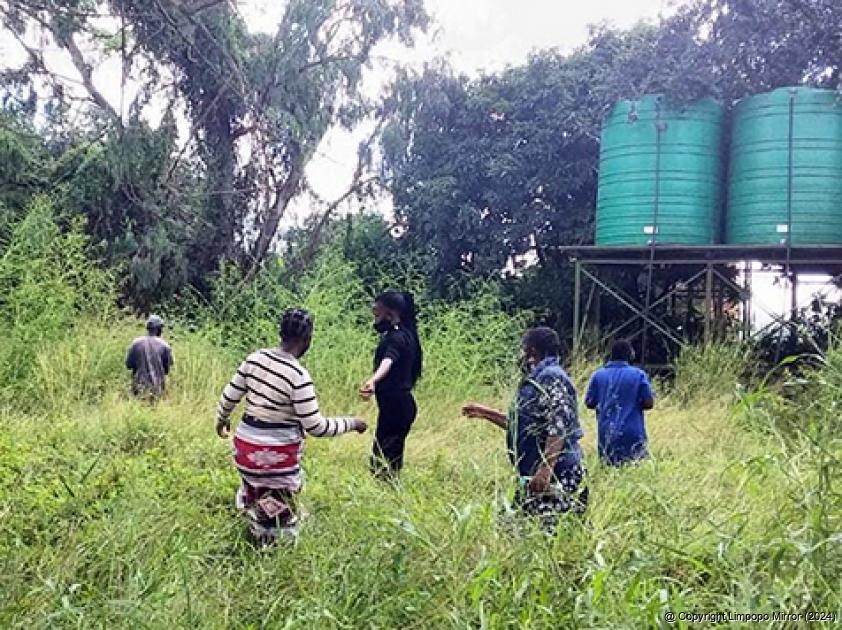

ADVERTISEMENT:

Local men and women trek to nearby forests in search of grasshoppers. The swarms of locusts provide an income for many. Photo supplied.
Locusts infestation offers income opportunities
The recent storms have undoubtedly brought great destruction in some rural parts of the region, but the rain seems to have also brought something positive with it - as if to compensate for all the losses. Swarms of locusts that came with the rain now present a (temporary) income opportunity for unemployed locals to catch and sell them to protein lovers.
A group of men and women trek off to nearby bushes every day in search of grasshoppers, with the hope of selling them and earning a little cash, in order for them to buy household needs and put food on the table.
Rendani Madadzhe (32) of Sibasa is an unemployed mother of two. She told Limpopo Mirror that, for the time being, she can provide her family with a proper meal, bought with the money she makes from selling locusts. “Of course, we know that the recent heavy rains brought misery to many families whose homes have been damaged,” she said. And yet, to unemployed people like herself, she firmly believes that the rains came to be a blessing from heaven.
“To put it right, God is good, and we are no longer broke. Now we can do some of the things ourselves, as we also sell these locusts,” she said. The little money they get from the children's grants only provide for their basic necessities. Without this extra income, she said, they cannot afford luxuries such as meat.
Ms Ntshengedzeni Makhesa (55) of Vhufuli village near Thohoyandou is a single mother of four. She harvests about two kilograms of fresh locusts on a good day to take home. “This is enough for my family and neighbours,” she said. According to her, locusts are very tasty and healthy, as they do not have a lot of fat.
The nutritional value of locusts is well known to dieticians and health experts. The protein content in grasshoppers is close to that of a similar-sized serving of chicken breast, but with a bit more fat.
Date:21 March 2021
By: Maanda Bele
Maanda Bele, born and raised in Nzhelele Siloam, studied journalism at the Tshwane University of Technology.
He is passionate about current news and international affairs.
He worked as part of the Zoutnet team as an intern in 2017.
He is currently a freelance journalist specialising in news from the Vhembe district.
Read: 1314

ADVERTISEMENT

ADVERTISEMENT:

ADVERTISEMENT:

Recent Articles
-

Holo ya musalauno i ḓuraho miḽiyoni ya malo wa dzi rannda yo netshedzwa kusi kwa Tshikhudini
16 April 2024 By Khathutshelo Raliphaswa -

Sport League Logs for 12 April 2024
15 April 2024 -

Vhamusanda Vha Lukhwarani vhari vha na mbonela phanḓa dza kusi kwavho.
15 April 2024 By Elmon Tshikhudo -

New Lukwarani leader may be blind, but has bright vision for his people
14 April 2024 By Elmon Tshikhudo -

Teach women to farm and they will change the world, says young farmer
14 April 2024 By Anton van Zyl

ADVERTISEMENT

Popular Articles
-

Leopards’ top striker dreams of playing for Kaizer Chiefs
22 March 2024 By Frank Mavhungu -

Well-known inventor, Prof Mulalo Doyoyo, dies
14 March 2024 By Victor Mukwevho -

Lesley Manyathela stadium remains a 'white elephant' to local clubs
23 March 2024 By Kaizer Nengovhela -

Murder suspect appears in Mutale Court
22 February 2024 By Victor Mukwevho -

Masindi case likely to introduce new era of customary law
24 February 2024 By Anton van Zyl -

Mukondeni's field of dreams has turned into a nightmare
17 February 2024 -

Many questions as man shoot himself in the head
15 March 2024 By Elmon Tshikhudo

